Beijing No.4 High School
Beijing No.4 High School (北京市第四中学) is a public high school in Xicheng District, Beijing, China.[1]
| Beijing No.4 High School 北京市第四中学 | |
|---|---|
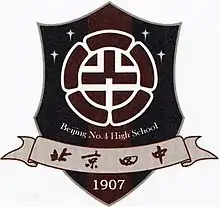 | |
.jpg.webp) School gate | |
| Address | |
A2 West Huangchenggen North St., Xicheng District China | |
| Coordinates | 39.931262°N 116.378257°E |
| Information | |
| Type | Public |
| Motto | Diligence, Rigor, Democracy and Pioneering |
| Established | 1906 (as Shun-Tian Secondary School) |
| School district | Xicheng District |
| Principal | Ma Jinglin (马景林) |
| Faculty | 300 (Main Campus) |
| Number of students | 1500 (Main Campus) |
| Campus type | Urban |
| Color(s) | Dark Blue White |
| Song | Song of Hope and Ideal |
| Branches | Senior High Campus Junior High Campus International Campus Fangshan Campus Shunyi Campus Hohhot Campus |
| Website | bhsf.cn |
The school was established in 1907 as the Shuntian Secondary School, and was later renamed Capital Public No.4 Secondary School. It took its current name in 1949. The school was among the first to be accredited as a "Municipal Model High School" by the Beijing Municipal Commission of Education. More than 96 percent of its graduates passed the enrollment line of key universities (Tier 1 schools) in Gaokao.[2][3] In a 2016 ranking of Chinese high schools that send students to study in American universities, Beijing No. 4 High School ranked number one in mainland China in terms of the number of students entering top American universities, and number four internationally for high schools outside of the United States.[4][5] James Palmer of Foreign Policy described it as "the rough equivalent of Eton."[6] Many Chinese politicians and their children have attended the school.
History
Qing Dynasty period
Beijing No. 4 High School is one of the oldest schools in Beijing. Its predecessor Shuntian Secondary School (顺天中学堂) was founded in 1906 by the Shuntian Government. Along with a few other primary and secondary schools established, the Qing government nullified the imperial examination system and commenced a more institutional system on academic studies and education as a result of the Hundred Days' Reform.
Republic of China period
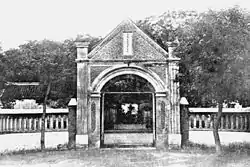
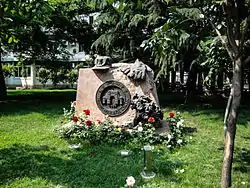
During the Republic of China (ROC) period, the Capital Department of Education Affairs (京师学务局) exercised jurisdiction over the school and renamed it Capital Public No. 4 Secondary School (京师公立第四中学) on September 29, 1912, which is thus the anniversary commemorated until today.
The May Fourth Movement of 1919 involved representative students from the school to parade and assemble at Tiananmen. After the city was invaded in 1939 by Japan, the school was mandated to conduct education of enslavement by Japan. The surrender of Japan in 1945 ended enslaved education, and the ROC government took over, with Sun Lubin (孙鹿宾) being principal. At that time, the secret service of the Chinese Communist Party (CCP) had been developing secret CCP members within the school.
In 1945, alumni from Tsinghua University, Yenching University and Peiyang University who argued against the Chinese Civil War propagated their ideas to Senior Grade 3 students in an auditorium in the Beijing No.4 High School. When the local police arrived and besieged the auditorium, a conflict with the students broke out, with several students injured by bayonet. The police then bound the alumni. The Mayor of Peking, He Siyuan, dispatched personnel to unbind them and apologized to the students.
From late 1948 to early 1949, the school was forced to cease its teaching and suspend classes when the Kuomintang army occupied the school, turned its buildings and campus into barracks to fight against CCP in the Chinese Civil War.
Post 1949 period
The Communist Party assumed control of the city on January 31, 1949. On March 15, the Beijing Military Management Commission (北京市军管会) sent Li Fusheng (李复生) to take over the school as principal. In April 1949, it set a Youth League branch and a Communist Party branch, and established a students union. It was at this time that the school was renamed to Beijing No.4 High School (北京市第四中学).
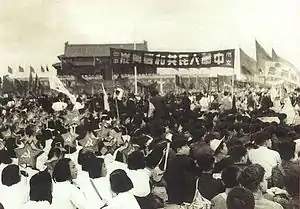
The Department of International Students was established in 2002. Since then, international students from at least 25 countries including Korea, Japan, New Zealand, Australia and Canada started to enroll in Beijing No.4 High School.
The International Olympic Committee (IOC) sent an evaluating delegation to inspect Beijing in February 2001. The No.4 High School was the only educational organ that received the evaluating committee. It was believed to have contributed to the success of Beijing in the 2008 Summer Olympics bidding.
On August 6, 2007, IOC President Jacques Rogge visited the school and delivered a speech there.[7][8]
CCP General Secretary and PRC President Jiang Zemin paid a visit to the school on November 7, 1995.[9] Chinese Premier Wen Jiabao visited the school on September 4, 2007, and expressed his wish for the school to become a world class one.[10]
On August 7, 2008, the day before the opening ceremony of the Olympic Games, the school was visited by the wife of IOC President Jacques Rogge, Anne Rogge and other foreign guests.[11]
On May 5, 2011, NBA player Roy Hibbert of Indiana Pacers visited the school as a part of the NBA Cares program. Roy Hibbert taught students some basketball tactics and skills.[12]
Main Campus
The Main Campus of BHSF is located within the area of Imperial City of old Beijing. It serves as the home of the BHSF's senior high school programs.
Old campus
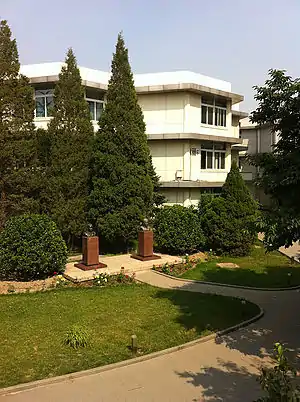
Historically, Shun Tian Secondary School (顺天中学堂) was situated in Wanping Senior Primary School (宛平高等小学堂) Capital Houku (京师后库) (Houku, Xicheng District, Beijing). The very old campus had been renovated and rebuilt many times, while the site was not changed. It occupied 65,733 m², of which the playground occupied 27,067 m², including basketball courts, tennis courts, football pitch, and volleyball courts. On the campus, there were around 1,500 trees and flowers in approximately 100 kinds. It also had a botanical garden where crops grown and a well pavilion.
Current campus
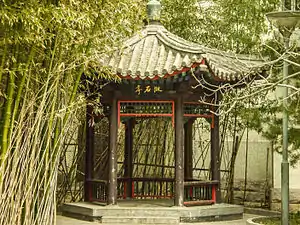
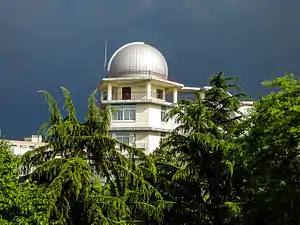
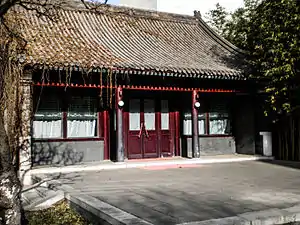
The school was refurbished[13] in 1983 and it was shrunk to an area of 4.26 hectares.[13] The new campus was designed by architect Huang Hui.[14][13]
Main Building
This four story building contains mostly classrooms, which are shaped in hexagons instead of rectangles. The design considerations include making the students feel less crowded and allowing the students at the side to view the blackboard with a smaller angle.[13]
Other buildings
The old principal's office (老校长室) is built in the style of ancient Chinese architectures. The 6-floor Technology Building has laboratories for chemistry, physics, biology, and computer sciences. On the sixth floor, there is an observatory for astronomy clubs. The Administration Building, built in 2007, has offices for teachers and staff and conference or meeting rooms, as well as a cafeteria and an auditorium. A build for music and art classes, a small clinic and dormitories can also be found on campus. The library holds roughly 170,000 books, 400 types of journals and magazines, 40 newspaper collections, 8000 optical discs and 2000 recording tapes.[15]
The school has a standard 400-meter running track, with two volleyball courts, six basketball courts and various gymnastic and other track and field facilities. There's also an indoor gymnasium and a swimming pool. Rooms for martial arts, ballet dance, table tennis and other sports are also found on campus.
The corridor from Main Building to Technology Building is one of the more notable characteristics in Beijing No.4 High School.
Branch Campuses
Junior High Campus
The Junior High Campus (or Beihai Park Campus) is located several blocks away from the Main Campus. It is adjacent to Beihai Park. It used to be the site of Beihai Middle School, which merged with Beijing No.4 High School in 2005.
International Campus
International Campus (or Business Street Campus) of Beijing No.4 High School (commonly abbreviated as BHSFIC) has been the home of BHSF's oversea classes since 2012. It is a small campus located on the Business Street of Xicheng District, Beijing. Students of this campus are registered as a part of the student body of Main Campus. There is a 3-year AP Program available at this campus. Most students who graduate from this campus attend colleges abroad.
Shunyi Campus
Shunyi Campus is a branch school of Beijing No.4 High School located in Shunyi, a district of Beijing. It has a huge campus (230 acres) and runs both junior and senior high school programs. Usually, however, this school is only considered as an affiliated school to BHSF administrated by the same school officials. Students there are not usually considered as a part of the student body of Main Campus, for their admission requirements and scores are different from those in Main Campus.
Fangshan Campus
Opened in 2014, the Fangshan Campus is the newest campus of Beijing No.4 High School. It is located in Fangshan, a satellite town outside of central Beijing. Buildings and facilities in this campus are totally environmental friendly. Similar to the Shunyi Campus, Fangshan Campus is usually considered as an affiliated school to BHSF.
Hohhot Campus
The Hohhot Campus of Beijing No.4 High School is the only BHSF branch campus that is not in Beijing Municipality. Instead, it is in the city of Hohhot, the capital of Inner Mongolia. It is a high school ran by the local government of Hohhot but working on a very deep integration with Beijing No.4 High School. This campus opened in 2012, and it became one of the best and most reputable high schools in Inner Mongolia only after two years.
Beijing No.4 Online School
Beijing No.4 Online School is a distance education platform of Beijing No.4 High School. It combines technology and education resources which connect teachers and students in No. 4 High School and others elsewhere. Beijing No.4 Online School offers countrywide online courses to students in elementary schools and high schools. It is an open platform with rich resources.
Administration
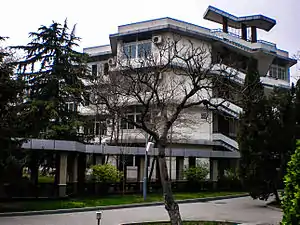
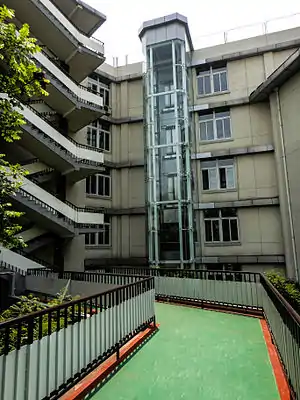
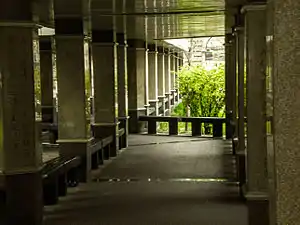
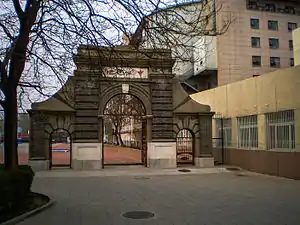
- Academic Departments
- Literature
- Mathematics
- English
- Physics
- Chemistry
- History
- Geography
- Politics (Politics, Economics and Philosophy)
- Arts (Music and Fine Arts)
- Biology
- Engineering
- Academic Affairs
- Teaching and Researching
- Student Departments
- Grades and Classroom Groups
- Student Regular Management
- Morality Office
- Student Government
- Student TV Channel
- Residential Halls
- Health Departments
- Physical Education
- Health Center
- High School Varsity Teams
- Sport Facilities
- Media Departments
- Media Technology
- Computer Sciences
- Internet Development
- General Service Offices
- Finance and Bureau
- Library
- General Management
- Supporting
- Dining Hall
- Telephone and Communication
- Administration Offices
- Registration
- Document
- School History Exhibition
- Security
- Drivers
- Alumni Association
- Oversea Class and Office
- School Property Management
- Civil Construction
- Affiliated Parts
- Swimming Instruction
- Souvenirs Store
- Digital Resource
- Extracurricular Institute
- International Center
- Online Program
Academic and student lives
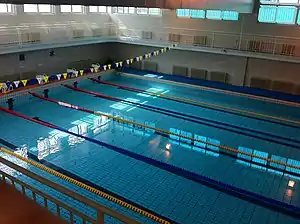
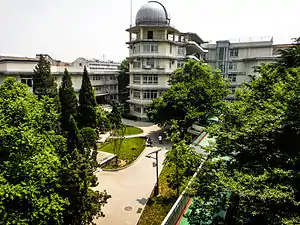
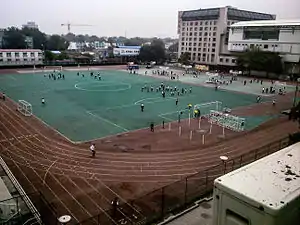
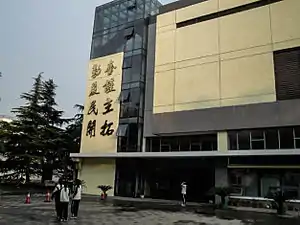
Academic
Beijing No.4 High School is one of the first schools in China that offers different mathematics and English classes to different students according to their academic performances. In International Science Olympiad, students from this school have won 7 gold medals, 3 silver medals and 1 bronze medal. The school also has talent program called Daoyuan class.
Beijing No.4 High School is known for its high average score in National Higher Education Entrance Examinations. Its average score is higher than most other high schools in Beijing. Every year, about forty percent of students from this high school could be admitted by Peking University and Tsinghua University, the two best universities in China. A larger portion of students will attend other highly ranked institutes including schools in the elite C9 League. Some students will be accepted by top institutes in Hong Kong as well as highly reputable and ranked universities or liberal art colleges in the United States, Canada and Europe.
Required and elective courses
All students are required to take all core courses of 14 subjects, including Chinese Literature, Mathematics, Chemistry, Physics, Biology, English, History, Political Sciences, Geography, Musicology, Fine Arts, Basic Engineering Skills, Computer Science and Physical Education. In the second year of senior high school, students will be divided into two groups based on their interests and career plans. Liberal-arts oriented students need to complete more courses in history, politics (including Philosophy, Economics and Political Sciences) and geography, while science-and-engineering oriented students need to take more credits in mathematics, biology, chemistry and physics. Besides, one research project is required for each academic year, and additional required internships or volunteer activities should be completed. Specifically, all students have to pass the swimming-skill test before graduation. Training and exercises in military, agriculture and business are usually required.
In addition to those required courses, students need to take one elective course every semester. Topics of those elective courses vary widely, including but not limited to film study, classical music, history of World War II, poetry, fashion design, photographing, industrial engineering, programming, 3D cartoon design, interior design, cooking, ancient Chinese, quantum physics, psychology, historical geography, GIS, mineralogy, guitar performance, harmonica, French language, mass media, economics, modeling and dissection.
Physical Education and athletes
Beijing No.4 High School regards Physical Education as one of the most important part of high school curriculum. From the first day of class till the day before graduation, it requires all students to take at least one hour PE class every day. The winter-day long-distance race is a tradition of this school. The PE classes are also divided into required ones and elective ones. The required classes are gymnastic, track and field, martial arts, basketball, swimming and sports theories; elective courses include upper levels of previous ones and soccer, volleyball, table tennis, baseball, fitness and Bridge Card. Noticeably, as mentioned above, all students must pass swimming test before graduation. During the three-year period, most students are also required to take part in a 2-week military training and several field trips and field trainings to build up their perseverance, confidence, leadership and teamwork skills.
Beijing No.4 High School has several varsity teams including soccer, basketball, swimming and martial arts. The basketball program at this high school is a powerhouse and they have won the championship of national high school basketball tournaments 4 times since 1998.
Organizations
Up to 2013, there are 24 student organizations at Beijing No.4 High School with various focuses, including:
- Archaeology Society
- Hip-Pop Society
- Ballet Society
- The Society of Debate
- The Club of Sciences and Technology
- Literature Society
- Orchestra (Now chamber music club)
- Drama Society
- The Choir
- Philanthropy Society
- Rock music society
- Astronomy Society
- The Society of Chinese Classics
- The IC A Capella Group
- Model United Nations
- Club of history book reading
- Basketball team
- Martial Arts team
- Hockey team
- Club of Kickboxing
- Society of cards and chess
- Marketing Educational Series for Entrepreneurs program
- Society of psychology
- literature society LiuShi流石文学社
Culture
Facts
- The calligraphic title Beijing Sizhong (北京四中, literally Beijing No.4 High School ) was inscribed by Guo Moruo.
- The school emblem features the Old Gate built in 1929.
- The school anthem Song of Hope and Ideal is composed by composer Shi Guangnan.
- On every May Fourth Day's night, there are Evening Parties of Lights on campus.
- On every late of December, there are Dancing Parties on campus as celebration for the New Year. Every students have to find their own partners and dressed up to come to the party.
- The old version of school uniform has a nickname Penguin, for it has white background with dark-blue sleeves which make it looks like a penguin. However, the old version of school uniform was replaced by Japanese and Korean styled new version in 2010.
Wang Daoyuan's admonishment
Wang Daoyuan was the first principal of Beijing No.4 High School. His admonishment to first students is curved on a glacial gravel and placed on campus:
You need to know that you are born to stand on your own feet, and to advocate and follow moral behaviors. If you act charitably to others, you can harvest respect and support. However, if you greedily affiliate with power and authority, eventually you will be in trouble, so never do that. It is your knowledge base rather than others' power that will help you the most. You are not able to obtain knowledge without real-life practice. Nowadays, many scholars and students are always afraid that no one will discover their talent and promote them, but few really think of contributing their skills to their communities. I think they are on a wrong way. Learning will be endless, so will the community service be, and that is why one should never stop exploring new things. People without moral excellence cannot get this idea, neither can those vulgar playboys. Now you are in your best ages, and you are dreaming big. Will you choose to be people who will make great contribution to the community and society? Or just to be some of those vulgar ones? You have to think twice. Go and find it!
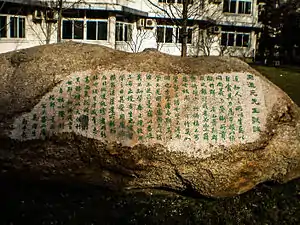
Sister schools
 United Kingdom Berkshire Eton College[16]
United Kingdom Berkshire Eton College[16] United Kingdom London Westminster School[16]
United Kingdom London Westminster School[16] United States Chicago Walter Payton College Prep[16]
United States Chicago Walter Payton College Prep[16] United States Texas St. John's School[16]
United States Texas St. John's School[16] United States California Sonoma Academy[16]
United States California Sonoma Academy[16] United States Utah Park City High School[16]
United States Utah Park City High School[16]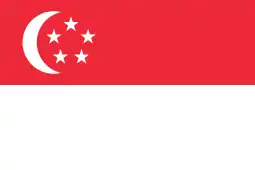 Singapore Singapore NUS High School[16]
Singapore Singapore NUS High School[16] New Zealand Christchurch Christchurch Boys' High School[16]
New Zealand Christchurch Christchurch Boys' High School[16] South Korea Seoul Seoul Science High School[16]
South Korea Seoul Seoul Science High School[16]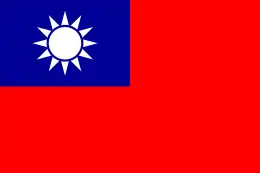 Republic of China Taipei Taipei First Girls' High School[16]
Republic of China Taipei Taipei First Girls' High School[16] Republic of China Taipei Taipei Municipal Jianguo High School[16]
Republic of China Taipei Taipei Municipal Jianguo High School[16] Republic of China Taichung Ming-Dao High School[16]
Republic of China Taichung Ming-Dao High School[16] Republic of China Taipei Taipei Municipal Zhongshan Girls High School[16]
Republic of China Taipei Taipei Municipal Zhongshan Girls High School[16] Republic of China Taipei Taipei Wego Private Senior High School[16]
Republic of China Taipei Taipei Wego Private Senior High School[16] Ireland Dublin Blackrock College[16]
Ireland Dublin Blackrock College[16]
Notable alumni
Science and Technology
- Fang Lizhi, an astrophysicist and prominent dissident.
- Feng Yuanzheng, a scientist and professor at California Institute of Technology, regarded as the founding figure of bioengineering, tissue engineering, and the "Founder of Modern Biomechanics"
- Yu Fuchun, the former chair and professor at Department of Physics at Peking University.
- Tu Chuanyi, a Chinese Academy of Sciences academician in earth and spatial sciences. Professor at Peking University.
- Zhang Zhaoxi, a Chinese Academy of Sciences academician in physics.
- Shi Yaolin, a Chinese Academy of Sciences academician in earth sciences; professor at University of the Chinese Academy of Sciences
- Hao Bolin, a Chinese Academy of Sciences academician in physics.
- Hu Peicheng, a psychologist and professor at Peking University
- Mao Erke, a scientist in radar and information technology. Professor at Beijing Institute of Technology.
- Ding Weiyue, a Chinese Academy of Sciences academician in math. Professor at Peking University.
- Wang Zhuang, vice chief designer of Shenzhou Spaceship.
- Zhong Binglin, former president of Beijing Normal University; professor in mechanical engineering at Southeast University
- Wang Chongyu, a Chinese Academy of Sciences academician in physics. A professor at Tsinghua University.
- Ding Guoyu, a famous scholar in geology and geophysics. Chinese Academy of Sciences academician.
- Wang Wencai, a Chinese Academy of Sciences academician in biology.
- Liu Guangzhi, a mining technician at Chinese Academy of Engineering
- Wang Chengmin, a geoscientist and seismologist, formerly at China Earthquake Administration
- Ma Wenyuan, a mathematician and professor at Beijing Normal University
- Wu Yansheng, a rocket designer; president of China Academy of Launch Vehicle Technology
- Chen Shihua, an engineer in water conservancy and professor at Tongji University and Peking University
- Li Yupei, a mathematician and professor at Capital Normal University, known as a popular science writer
- Xia Zhengkai, a geologist, geographer and professor at Peking University
- Wang Siyuan, a biologist and professor at Yale School of Medicine
Humanities and Social Sciences
- Li Ao, a Taiwanese writer, social commentator, historian, and independent politician[17]
- Wang Meng, a writer; previously the vise president of Ministry of Culture of the People's Republic of China[18]
- Bei Dao, a prominent Misty Poet and a dissident.
- Feng Zhi, a poet and writer
- Ngapoi Jigme, former president at Radio Free Asia
- Yu Dan, known for her popular retelling of Confucianism and other ancient Chinese philosophies.
- Zhou Xiaozheng, a famous socialist and professor at Renmin University
- Li Yiyun, a writer and professor at University of California, Davis.
- Cong Weixi, a famous writer
- Shen Zhihua, a historian researching on cold war; a professor at East China Normal University and a guest lecturer at Chinese University of Hong Kong.
- Zhang Shunjiang, the very first Chinese professor in sciences of decision making. Professor at University of Science and Technology of China. Visiting professor at New York University.
- Fu Yang, the vice chair of All China Lawyers Association
- Li Qiang, professor and chair of School of Social Sciences at Tsinghua University. Visiting scholar at Bristol University and University of Michigan.
- Dai Shihe, a painter; the chair of the Department of Oil Painting at China Central Academy of Fine Arts
- Zhang Taisu, a professor at Yale Law School
- He Fangchuan, a historian and professor at Peking University
- Li Qiang, a scholar in social science and professor at Tsinghua University
- Zhang Xiaoshan, the director of Rural Area Development programs at Chinese Academy of Social Sciences
Politics and Military
- Yu Zhengsheng, a politician; former member of Politburo Standing Committee of the Chinese Communist Party
- Liu Yushan, a politician; the Secretary-General of the Executive Yuan in 2005-2007.
- Bo Xilai, a former Chinese politician; On 22 September 2013, Bo was found guilty of corruption, stripped of all his assets, and sentenced to life imprisonment.
- Ma Kai, a politician, formerly a State Councilor and Secretary General of the State Council of China[18]
- Ling Qing, former Permanent Representative of China to the United Nations (1980-1985)
- Wang Kunlun, a Chinese politician and co-founder of the Revolutionary Committee of the Kuomintang
- Liu Yuan, a Chinese politician and serviceman; previously the vise commander of Chengdu Military Region[18]
- Lin Liguo, the person in charge of Project 571 Outline; son of Lin Biao
- Qiao Zonghuai, former vice president of Ministry of Foreign Affairs in China
- Jiang Xiaoyu, previously represented in Chinese People's Political Consultative Conference
- Chen Yuan, the former Vice Chairperson of the Chinese People's Political Consultative Conference; Head of China Development Bank
- Luo Shiqian, the former Party Secretary of Shanghai
- Zhang Xuesong, Deputy Chief of the Intellectual Property Division of Beijing Municipal High People's Court
- He Pengfei, Lieutenant general of the Navy in the People's Liberation Army; son of He Long
- Chen Haosu, former chairman of the Chinese People's Association for Friendship with Foreign Countries
- Tao Xiping, member of National People's Congress Education, Science, Culture and Public Health Committee
- Nie Dajiang, president of Lanzhou University; former vice chief minister in Publicity Department of the Chinese Communist Party
- Geng Shuang, a politician, formerly the deputy director of the Foreign Ministry Information Department of China
- Xu Xiaoyan, Lieutenant general of the People's Liberation Army, official in the Joint Staff Department of the Central Military Commission
- Yang Dongming, Lieutenant general of the People's Liberation Army Air Force
- Sun Yinbai, a celebrated translator with the Flying Tigers during the World War II
Arts and Sports
- Xie Fei, a film director; notable films include Black Snow and Woman Sesame Oil Maker.
- Chen Kaige, a film director; notable films include Farewell My Concubine, Together, The Promise and Caught in the Web.[18]
- Teng Huatao, a film director; notable films include Naked Wedding, Chow Through Pain and Dwelling Narrowness
- Gao Xiaosong, a songwriter, musician, and talk show host[18]
- Zhang Lu, a famous soccer game commentator. Vise chair of board at Beijing Guoan F.C.
- Shu Chang, an actress who played roles in Xiaozhuang Mishi, The Story of a Noble Family, Huang Taizi Mishi, Lian Cheng Jue, Demi-Gods and Semi-Devils and Royal Tramp.
- Liu Yushan, an artist; chief editor at Central Fine Arts Publishing House
- Han Maofu, international referee of basketball
- Wu Jing, an actor who played roles in the Wolf Warrior series, The Sacrifice, The Climbers, and The Wandering Earth
- Wang Weiguo, an actor and winner of Plum Blossom Prize
- Ya Ning, a TV host in China Central Television
Business
- Yu Xiaoyi, financial analyst, and investment banker turned venture capitalist[19]
- Kong Dan, an entrepreneur and economist; president of China Everbright Group.
- Qin Xiao, president of China Merchants Bank
References
- "About". Beijing No.4 High School. Archived from the original on August 16, 2018. Retrieved September 11, 2023.
- Wong, Edward. "In China, Breathing Becomes a Childhood Risk Archived April 24, 2018, at the Wayback Machine" (Archive). The New York Times. April 23, 2013. Retrieved on October 19, 2015.
- "Beijing No.4 High School". Archived from the original on May 3, 2014. Retrieved July 15, 2011.
- Sohu Education "http://learning.sohu.com/20160128/n436133150.shtml Archived April 17, 2016, at the Wayback Machine" Jan 28, 2016.
- CollegeNode Ranking ""中国内地出国留学Top50中学排行榜". Archived from the original on October 14, 2016. Retrieved April 5, 2016."
- Palmer, James (March 21, 2018). "Nobody Knows Anything About China". Foreign Policy. Archived from the original on March 11, 2022. Retrieved March 11, 2022.
- "Rogge visits Olympic Education Model School". Archived from the original on October 24, 2012. Retrieved July 15, 2011.
- "国际奥委会主席罗格考察北京四中". Archived from the original on September 29, 2011. Retrieved July 15, 2011.
- 徐江善; 孙玉山 (November 9, 1995). "江泽民在北京考察". 人民日报 (in Simplified Chinese). p. 1.
他还考察了北京吉普车有限公司、北京第四中学、西单商场、恩济里小区。
- 李斌 (September 21, 2007). "学校代表着国家的未来——温家宝考察北京四中纪实". 人民日报 (in Simplified Chinese). p. 1.
要把四中办成世界一流的学校,中国要有更多像四中这样的学校,这是我们的愿望。(Beijing No.4 High School should be developed into a world-class one and China should have more schools of this kind.)
- "罗格夫人参观北京四中[组图]". Archived from the original on November 7, 2012. Retrieved July 15, 2011.
- "罗伊-希伯特现身北京四中 亲自传授禁区内进攻技巧". Archived from the original on August 11, 2011. Retrieved July 16, 2011.
- 黄汇 (1986). "北京四中设计" [Beijing No.4 High School Design]. 建筑学报 (in Simplified Chinese). Beijing: 中国建筑学会 (2): 45–50. ISSN 0529-1399. Archived from the original on September 11, 2023. Retrieved October 10, 2019.
- "Women in Architecture". China. ARVHA. Archived from the original on March 26, 2012. Retrieved February 5, 2012.
- "Library". Archived from the original on October 26, 2018. Retrieved November 2, 2018.
- "友好学校". Archived from the original on July 26, 2011. Retrieved July 16, 2011.
- "这就是李敖". Archived from the original on September 11, 2012. Retrieved July 16, 2011.
- "北京四中 皇城根里"第一牛中学"". 《看天下》. Archived from the original on May 22, 2013. Retrieved July 16, 2011.
- "Home". virginia.edu. Archived from the original on November 21, 2019. Retrieved August 8, 2022.